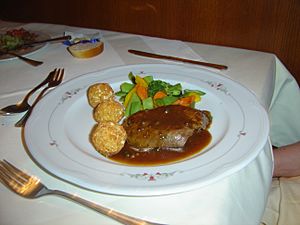Brown sauce (meat stock based) facts for kids
A brown sauce is a yummy sauce often served with meat. It gets its rich color and flavor from a meat stock base. This means it's made from the liquid left over after cooking meat and bones. Sometimes, cooks make it thicker by letting it simmer until some water evaporates. They might also add a special mix called a roux (pronounced "roo"). A roux is made by cooking flour and fat together until it turns brown. This makes the sauce thicker and gives it a deeper taste.
Contents
What is Brown Sauce?
In classic French cooking, a brown sauce usually starts with a meat stock. It's made thicker by simmering it down, which is called reduction. Sometimes, a browned roux is added too. This makes it a bit like gravy, but often more complex to prepare. A famous example of a French brown sauce is espagnole sauce.
Brown sauce is very popular in many Scandinavian countries. Each country has its own special way of making it.
Danish Brown Sauce
In Denmark, brown sauce is called brun sovs. It's a very common sauce. It's usually made with a meat stock base. Today, people often use bouillon cubes to make a quick broth instead of fresh stock. The sauce is thickened with a roux. Sometimes, a special product made of dark caramelized sugar is added. This product is called brun kulør (which means "brown coloring") or madkulør ("food coloring"). It gives the sauce a rich, deep brown color. It's similar to gravy browning you might find in other countries.
Norwegian Brown Sauce
The Norwegian version is called brun saus. It's made in a similar way to the Danish one, usually with wheat flour. To get the color, cooks often brown butter in the pan first. Then, they add wheat flour and let it brown even more. Sometimes, they add food coloring called sukkerkulør (sugar coloring). Soy sauce and even brown cheese can be added for both color and taste. The sauce often takes on the flavor of the meat it's served with. This is because it's common to cook the meat in the sauce for a while before serving.
Swedish and Finnish Brown Sauce
In Sweden (where it's called brunsås) and Finland (ruskeakastike), brown sauce is often served with meatballs. This sauce is usually light brown and thick. It's made like the French sauce espagnole, by combining a dark brown roux with stock. However, it gets a lighter color and smoother texture because cream is added. It's often spiced with black pepper. Many people add other ingredients to make it taste even better. These can include soy sauce, blackcurrant jelly, apple sauce, onions, mustard, allspice, or tomato puree. You can even buy this sauce ready-to-use or as a powder in stores.
da:Brun sovs sv:Brunsås
 | Lonnie Johnson |
 | Granville Woods |
 | Lewis Howard Latimer |
 | James West |


